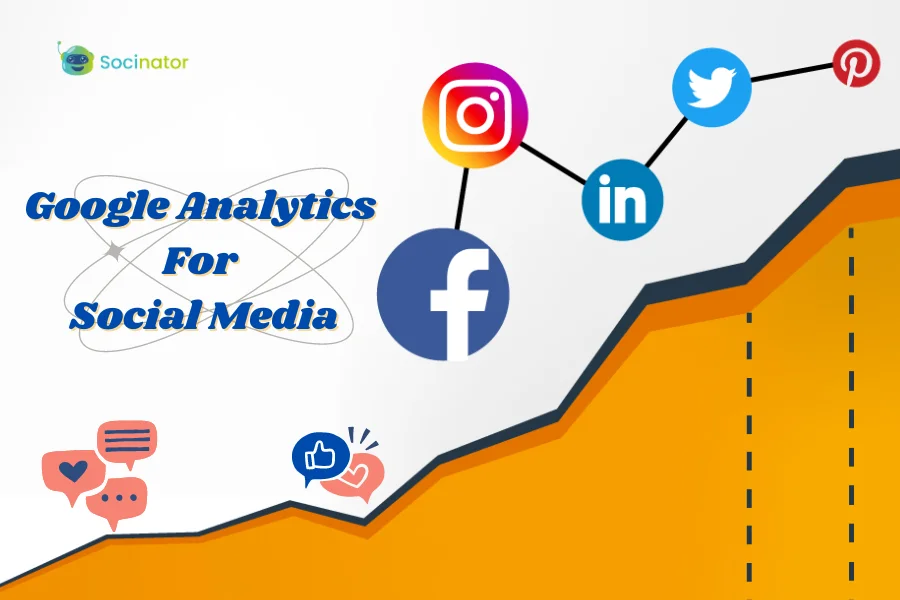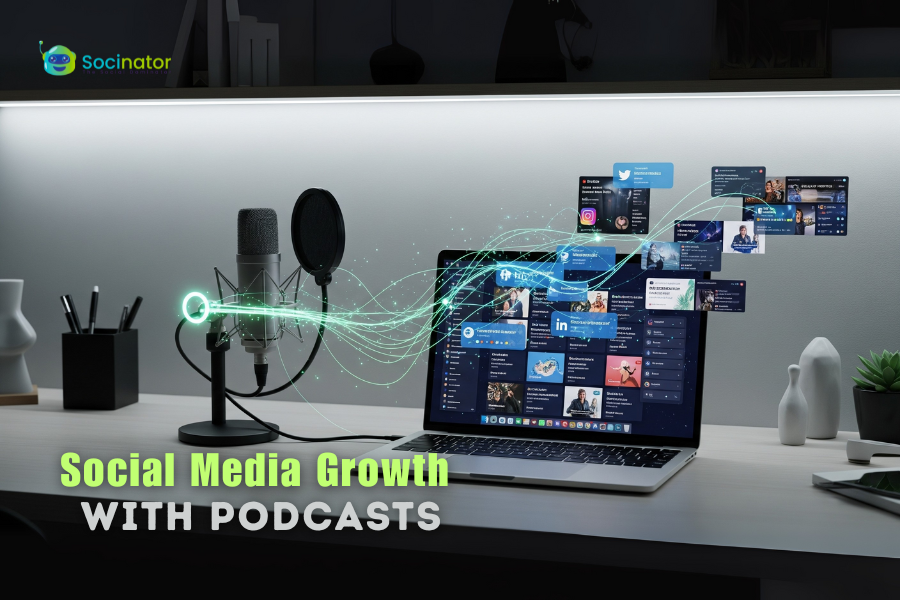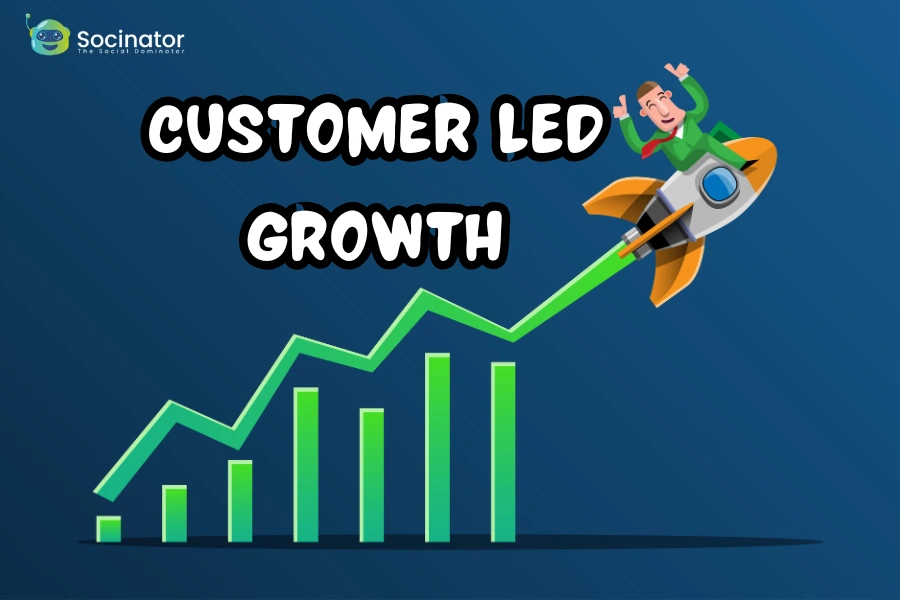Proving the ROI of your social media efforts is a common challenge among marketers. You are not alone in facing this dilemma. For marketers, demonstrating the value of social media campaigns is a big concern. Google Analytics for Social Media is here to help—the game-changer in the competitive marketing world.
This invaluable tool offers insights into audience behavior and engagement, providing a competitive edge in tracking performance and resonating content. By integrating social media data with website analytics, you can make informed, data-driven decisions to optimize your marketing strategy and achieve your goals.
No more guesswork, as this tool provides the clarity you require to excel in today’s competitive landscape. In this blog, you will discover how this tool can revolutionize your social media game and drive real results.
So, what has kept you waiting? Let’s get started!!
Listen To The Podcast Now!
What Is Google Analytics?
Google Analytics is a free website analytics tool offering extensive insights into your website and its visitors, including those coming from social media. With Google Analytics for social media, you can track:
- Total site traffic and its sources (including social networks)
- Traffic for individual pages
- The number of leads converted and their origins
- Whether your traffic is from mobile or desktop devices
You can gain deeper insights into your social media performance by integrating Google Analytics into your social media analytics and reporting strategy. Google Analytics social media reports enable you to:
- Identify which social media platforms drive the most traffic
- Calculate the ROI of your social media campaigns
- Determine which content performs best on each social media platform
- Track how many sales conversions come from social media
You can optimize your social media campaigns and enhance your overall marketing strategies with data. In the next section you will explore the importance and impact of social media analysis.
To further enhance your social media strategy, tools like Socinator can automate and optimize your social media efforts. Socinator helps manage multiple social media accounts, schedule posts, and analyze engagement, providing additional data to refine your campaigns. By combining Socinator with Google Analytics, you can achieve a more comprehensive view of your social media performance and drive better results.
Why Is Google Analytics For Social Media Essential For Marketers?
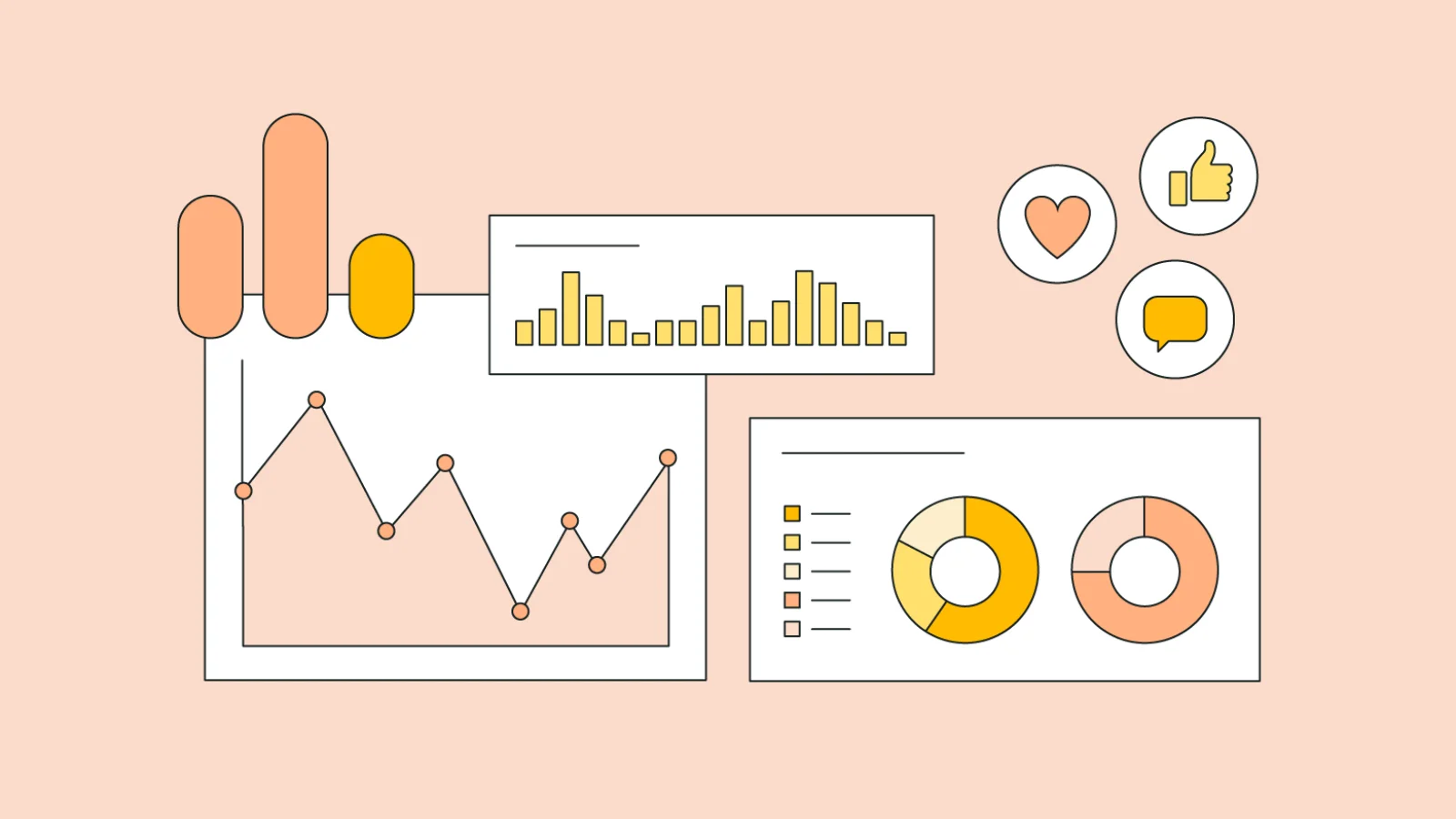 The 2023 State of Social Media Report underscores a pressing need among business leaders to leverage social platforms effectively.
The 2023 State of Social Media Report underscores a pressing need among business leaders to leverage social platforms effectively.
Google Analytics offers a comprehensive approach to gauging social metrics and contextualizing regular reports within broader marketing objectives. Here’s how it proves invaluable:
Crafts Impactful Top-Funnel And Mid-Funnel Social Strategy
Top-of-funnel initiatives target new audience engagement, tracking metrics like web traffic, impressions, and average time on site. This is crucial for evaluating the efficacy of brand awareness efforts. Conversely, mid-funnel strategies aim to convert these visitors into leads, highlighting purchase intent.
However, successful mid-funnel endeavors depend on capturing top-funnel traffic effectively. Google Analytics for social media facilitates this by capturing funnel metrics, pinpointing conversion gaps, and ensuring alignment between top-funnel and mid-funnel efforts. Demonstrating social media ROI and its business impact is pivotal for social media managers, who must underscore the significance of both top-of-funnel and mid-bottom-funnel metrics in their reports.
Aligns Social Metrics With Business Objectives
Social metrics must sync with broader marketing initiatives and organizational goals to provide a holistic view of the social strategy’s effectiveness.
For instance, understanding which social platforms drive website traffic is crucial, but it is equally essential in analyzing user engagement with content. Similarly, if your goal is to increase qualified leads and sales, Google Analytics for social media enables the comparison of key performance indicators against competitors, traffic sources, and keywords. It facilitates campaign modifications for better results.
This capability is vital for planning future social campaigns and achieving sustained success across social and better business objectives.
Understands Target Audience
Google Analytics furnishes valuable insights into audience demographics, online behavior, interests, and preferred online platforms. These metrics inform content creation and social tactics tailored to resonate with the target audience, thus fostering user engagement and strategic campaign success.
For instance, with audience demographics, marketers can determine whether a live product demonstration or a promotional launch with special offers would yield optimal brand amplification and social ROI.
Integrating social media automation tools like Socinator adds a layer of automation and management to streamline social media efforts, complementing Google Analytics for social media insights for enhanced audience engagement and campaign success.
Social Media Management With Socinator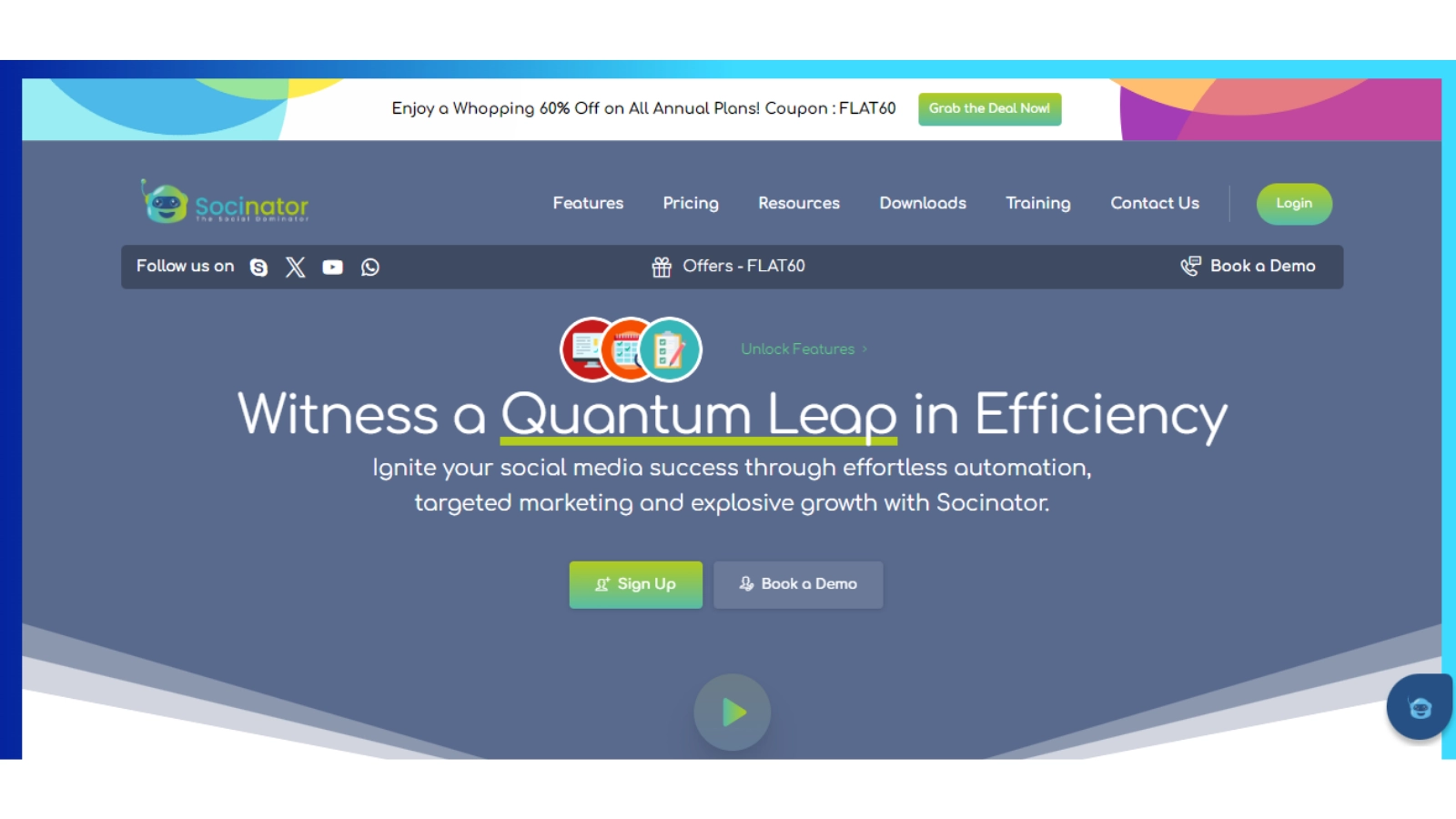 Socinator is a robust social media management and automation tool designed to streamline marketing efforts across various platforms. Its features empower users to effectively manage multiple social media accounts, automate tasks, and enhance engagement. Here’s an overview of its key features:
Socinator is a robust social media management and automation tool designed to streamline marketing efforts across various platforms. Its features empower users to effectively manage multiple social media accounts, automate tasks, and enhance engagement. Here’s an overview of its key features:
- Multi-Account Management: Socinator allows users to manage multiple social media accounts from a single dashboard, saving time and effort in switching between platforms.
- Automation: With Socinator, users can automate multiple tasks such as posting content, scheduling posts, liking, commenting, following, and unfollowing, enabling consistent activity without manual intervention.
- Advanced Scheduling: This social media management tool offers advanced scheduling capabilities, allowing users to plan and schedule posts at optimal times for maximum reach and engagement, ultimately helping to get more Google analytics for social media.
- Analytics and Reporting: Users can track the performance of their social media campaigns with comprehensive analytics and reporting tools provided by Socinator. This tool helps evaluate strategies’ effectiveness and make data-driven decisions.
- Broadcast messages: Users can efficiently broadcast important news to all their fans using the platform’s advanced scheduling capabilities, ensuring optimal reach and engagement by planning and scheduling posts at the best times.
Socinator empowers users to streamline their social media management processes, increase efficiency, and achieve their marketing objectives effectively.
How to Set Up Google Analytics for Social Reporting?
Follow these steps to configure using Google Analytics for social media reporting, providing insights into how your social efforts impact marketing campaigns and revenue.
Identify Your Key Questions
Determine the essential metrics you want to track based on your SMART (Specific, Measurable, Achievable, Relevant, Timely) goals. Consider critical questions like:
- Which social channels are driving the most new users to my website?
- Which social accounts generate the most website engagement?
- How often do users visit my brand, and how do they interact with my content?
Using these questions as guiding points helps you analyze key areas like month-over-month engagement rates and traffic source fluctuations, enabling you to identify underlying causes. It is crucial to build a narrative highlighting how your social efforts align with your broader marketing strategy.
Set Up Data Collection in Google Analytics
You can start tracking web data in Google Analytics for social media in three steps:
Create a Google Analytics 4 (GA4) property, add a data stream, and use a Google Analytics code.
Step-1: Create a New Google Analytics 4 Property
- Create Property: Go to the Property column and click Create Property on your admin page. Ensure you have selected the correct account from the Account column.
- Enter Details: Provide your business name for the new property, and select the reporting time zone and currency. Note that changing the time zone for an existing property may cause a data spike due to the time shift.
- Select Industry and Business Size: Choose your industry category and business size, then click Next.
- Define Goals: Choose how you want to use Google Analytics for social media, such as “Generate more leads” to receive relevant reports.
Create Property: Click “Create” to finalize your new GA4 property.
Step 2: Add a Data Stream
Add Stream: In the Property column, go to Data Streams > Add stream (iOS app, Android app, or Web).
Integration: Tag the property of your website builder or CMS-hosted website (like WordPress or Hubspot), or add the Google tag to your web pages using Google Tag Manager.
Step 3: Using a GA Code
Add a short JavaScript measurement code to each web page to measure web performance data. This code tracks user interactions, allowing you to compare web page performance and make informed decisions to achieve your targets.
Create Social Media Conversion Events in Google Analytics
Conversion events in Google Analytics 4 replace goals from Universal Analytics. They track user activities that assess the effectiveness of your social and digital marketing campaigns.
Migrating Goals to GA4 Conversion Events
Navigate to Admin Account: In the Property column, select the GA4 property set for data collection.
Setup Conversions: Go to Setup Assistant > Set up conversions > Actions icon > Import Universal Analytics.
Select Goals: In the “Import existing goals from your connected property” panel, select the goals to recreate as conversion events. Confirm when successfully recreated.
Marking Events as Conversions
Mark conversion events, such as in-app purchases, web purchases, or app-store subscriptions, as significant user interactions.
Mark as Conversion: Go to Admin > Property > Events > Existing Events, then toggle “Mark as conversion” for the desired event.
How Should Marketers Measure Their Social Analytics Success?
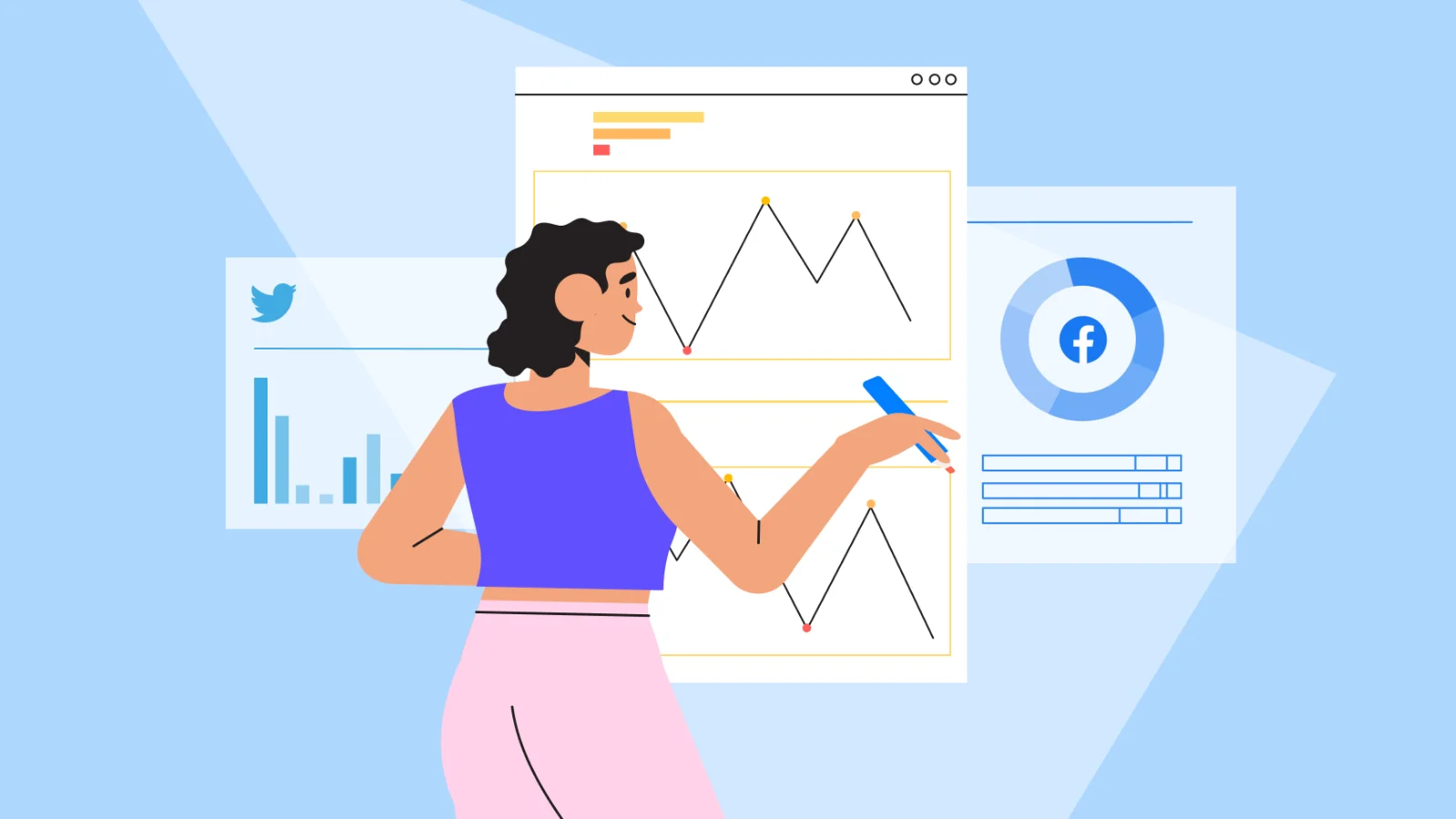 Discovering how to measure your success through Google Analytics for social analytics is crucial for any business. Google Analytics is one of the most widely used analytics platforms, offering robust capabilities for tracking and analyzing data from social media profiles. Here’s how to leverage Google Analytics for social media tracking effectively:
Discovering how to measure your success through Google Analytics for social analytics is crucial for any business. Google Analytics is one of the most widely used analytics platforms, offering robust capabilities for tracking and analyzing data from social media profiles. Here’s how to leverage Google Analytics for social media tracking effectively:
Define Your Objectives: Clarify your social media goals before diving into analytics. Determine what you aim to achieve through your social efforts, whether it drives traffic to specific pages, increases user engagement, or boosts conversions. Setting up goals within Google Analytics ensures you’re measuring the right metrics aligned with your business objectives.
Explore Google Analytics’ Social Reports: Once you set your goals, familiarize yourself with Google Analytics’ standard social reports. These reports, accessible via Reporting > Acquisition > Social, provide insights into various aspects of social media performance. From tracking referral traffic to analyzing user engagement, these Google analytics for social media reports offer valuable data to evaluate your social strategies effectively.
Focus On Goal-Specific Reports: While the Overview report offers a broad overview of social performance, delve deeper into reports tailored to your specific goals. For instance, the Landing Pages report is ideal for analyzing traffic to particular pages, while the Conversions report correlates social activity with goal completions. By dissecting these reports, you gain deeper insights into the impact of your social efforts and can refine your strategies accordingly.
By leveraging Google Analytics’ social analytics capabilities, you can measure the effectiveness of your social media campaigns and optimize your approach to drive meaningful results.
Read More
Best Social Media Management Tools For Businesses To Achieve Every Milestone
Influence Of Social Media Analysis In Your Marketing Strategy
Google Analytics For Social Media Best Practices
Here are the best practices:
Automatic Tracking
Setting up automatic tracking ensures that all social media activity directing traffic to your website gets recorded in Google Analytics. By default, Google Analytics captures fundamental referral data, but it’s essential to configure advanced tracking features for a more comprehensive analysis.
To complement this setup, use tools like Socinator to streamline and automate your social media management. This approach ensures you accurately monitor and analyze your social media efforts, enhancing your understanding of traffic sources and campaign effectiveness.
Custom Campaign Tagging
Custom campaign tagging involves adding unique parameters to URLs shared on social media. These tags allow Google Analytics to attribute specific traffic to individual campaigns, providing detailed insights into the performance of each social media initiative—essentially, clear and consistent naming conventions for campaign tags to ensure accurate tracking and reporting.
Comparing Paid and Organic Efforts
Analyzing the effectiveness of paid and organic social media efforts helps identify which channels and strategies yield the best results. By comparing Google Analytics for social media metrics such as traffic, engagement, and conversions between paid and organic sources, marketers can allocate resources more effectively and optimize their social media campaigns for maximum impact.
Utilize Social Reports
 Google Analytics offers dedicated social reports that provide in-depth social media traffic and engagement analytics. Exploring these reports allows marketers to gain valuable insights into audience behavior, referral sources, and content performance across various social platforms. Customizing these reports further enables marketers to tailor their analysis to specific objectives and KPIs.
Google Analytics offers dedicated social reports that provide in-depth social media traffic and engagement analytics. Exploring these reports allows marketers to gain valuable insights into audience behavior, referral sources, and content performance across various social platforms. Customizing these reports further enables marketers to tailor their analysis to specific objectives and KPIs.
Interpret Data in Context
While data analysis is crucial, it’s equally important to understand the findings within the context of broader business goals and objectives. Understanding the purpose behind Google Analytics for social media initiatives drives brand awareness, generates leads, or drives sales—helps marketers extract actionable insights from the data and make informed decisions to optimize their strategies.
Track Social Sharing Widgets
Monitoring social sharing widgets embedded on websites provides insights into how users interact with and share content across social platforms. Implement tracking mechanisms like Google Analytics events. It allows marketers to track social interactions directly from their websites and facilitates a comprehensive analysis of social engagement and content virality.
Addressing Dark Social
Dark social refers to social sharing that occurs through private channels, such as messaging apps or email, which makes it difficult to track using traditional analytics tools.
To measure dark social, marketers can leverage specialized tools or techniques, such as URL shorteners with tracking capabilities or advanced analytics platforms that capture indirect referral traffic. By shedding light on dark social, marketers can better understand the complete customer journey and optimize their marketing efforts accordingly.
Use Native Social Analytics
While Google Analytics for social media provides valuable insights into website traffic from social sources, native analytics offered by social media platforms provide additional context and granularity.
By analyzing native social analytics, marketers can gain insights into audience demographics, content performance, and engagement metrics specific to each social platform. Integrating these insights with Google Analytics data provides a comprehensive view of social media performance and facilitates data-driven decision-making.
Leverage Click Analytics
Utilize click analytics tools. It enables marketers to track engagement with social posts and identify top-performing content.
Marketers can gauge audience engagement and refine their content strategy to maximize impact by analyzing click-through rates, likes, shares, and comments. Leveraging click analytics tools streamlines the monitoring process of social media performance and allows marketers to adapt their tactics based on real-time feedback.
Implementing these best practices empowers marketers to leverage Google Analytics for social media effectively for social media analysis, gain actionable insights, and optimize their strategies for better performance and ROI.
Wrapping Up
Google Analytics is an indispensable tool for social media marketers, offering invaluable insights into audience behavior, preferences, and platform interactions. By harnessing its robust analytics capabilities, marketers can refine their content strategies, optimize posting schedules, and tailor campaigns to resonate with their target audience effectively.
With a data-driven approach facilitated by Google Analytics, businesses can enhance engagement, drive conversions, and ultimately achieve their marketing objectives. By integrating tools like Socinator helps marketers elevate their campaigns further, leveraging advanced scheduling, automation, and engagement features to maximize impact.
With the powerful combination of Google Analytics for social media and Socinator, businesses gain a competitive edge, harnessing data-driven strategies to foster meaningful connections, drive conversions, and add social media to Google Analytics to propel growth in the ever-evolving realm of social media.
As social media continues to evolve, leveraging the power of Google Analytics ensures marketers stay agile, informed, and poised for success in the dynamic digital landscape.
Frequently Asked Questions About Google Analytics For Social Media
Are you curious about Google Analytics and social media relationships? Here are some answers to common queries.
Does Google Analytics monitor social media activity?
Absolutely! While Universal Analytics had a dedicated report section for social media tracking, Google Analytics 4 doesn’t offer this feature directly. However, you can still create custom reports yourself, as we’ll explain in our tutorial.
What does “Organic Social” mean in Google Analytics 4?
In Google Analytics 4, social media traffic is categorized into organic and paid sources. Visits resulting from regular posts and profile links fall under the Organic Social channel, while those from paid social media ads are classified under Paid Social.
Can Google Analytics track Facebook activity?
Yes, Google Analytics for social media can track traffic to your website originating from Facebook. For guidance on installing a Meta pixel for Facebook on your website, refer to our tutorial “How to Add a Facebook Pixel to WordPress (Easiest Way).” Additionally, if you’re running Facebook ads, check out “How to Track Meta (Facebook) Ads in Google Analytics.
Does Google Analytics Track Instagram Activity?
Indeed it is. To track activity from Instagram, utilize custom campaign URLs as a workaround.

